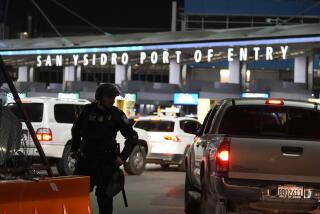U.S. Probers Charge 2 in Sale of Poison Gas Ingredient
- Share via
BALTIMORE — American investigators, in a crackdown on U.S. exporters who supply chemical weapons components to Third World countries, on Monday charged a New Jersey man and a Dutch businessman with seven criminal counts each for allegedly selling thiodiglycol, a major ingredient of mustard gas, to Iran and Iraq.
U.S. Atty. Breckinridge L. Willcox also announced that Alcolac International Inc., a Baltimore manufacturer of the chemical, will plead guilty to violating a U.S. export law by knowingly selling the restricted substance to a foreign country.
Sanctions Being Considered
In all, investigators believe that 90 tons of the thiodiglycol produced by Alcolac--enough to make about 90 tons of mustard gas when mixed with hydrochloric acid--reached Iran. As many as four shipments of the stuff, more than 500 tons, are believed to have reached Iraq by surface routes after having been illegally taken to Jordan in shipments orchestrated by the two men, Willcox said.
Both Iran and Iraq are widely believed to have used chemical weapons against each other and, in the case of Iraq, against its own population, during their eight-year Persian Gulf War, which ended with a truce last August. Accounts of their chemical use--and more recent evidence that Libya has built a chemical weapons plant--have prompted Congress to consider sanctions against countries that try to develop the weapons and foreign companies that assist them in doing so.
The Baltimore case offers the first indication that Iran and Iraq may have relied on the cooperation of American firms to help produce their stocks of the poisonous gas. American officials in recent months have been critical of West Germany, whose relatively lax export policies enabled that nation’s firms to sell Third World countries technology, hardware and chemicals that plants needed in the production of poison gas weapons.
“The message we want to deliver to exporters is that U.S. companies cannot continue to sell anything to anybody for any price, without asking any questions,” said Donald G. Turnbaugh, a special agent of the U.S. Customs Service and one of the case’s principal investigators. “Hopefully a case of this size will demonstrate that.”
In outlining the charges against Nicholas J. Defino, an executive of the United Steel and Strip Corp. of Brooklyn, N.Y., and Dutch businessman Franz Van Anraat, Willcox described the use of “fraudulent . . . shippers’ export declarations, phony destinations, circuitous routing and sham companies.”
Defino, a New Jersey resident who ordered shipments of thiodiglycol from Alcolac for export, is described in court papers as a “principal” of the New York-based Nu Kraft Mercantile Corp., for which no incorporation papers or industrial listings appear to exist. Nu Kraft “is affiliated” with the United Steel and Strip Corp., according to documents released by investigators.
All the shipments appear to have occurred between March, 1987, and April, 1988, the final year of desperate fighting between the two Persian Gulf adversaries.
Defino surrendered Sunday to authorities in Baltimore and was released on $100,000 bail Monday. Van Anraat was arrested in Italy on Jan. 26 and is expected to be extradited to the United States. Under the terms of the plea agreement, Alcolac is expected to pay fines of up to $100,000.
Alcolac, whose officials said that the chemicals were sent to the Middle East without their knowledge, will cooperate with a continuing grand jury investigation into the sale of chemical weapons components to Mideast countries, Willcox added. Authorities said that they expect to bring additional charges against individuals and firms as their investigation widens.
More to Read
Sign up for Essential California
The most important California stories and recommendations in your inbox every morning.
You may occasionally receive promotional content from the Los Angeles Times.














